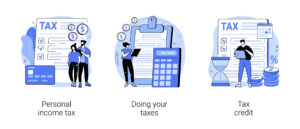Do not Be the Victim of a Tax Scam
As the tax season continues to be in full swing we here at GROCO continue to hear of more and more tax scams making the rounds. We’ve discussed tax scams before, but it never hurts to repeat this important information, especially at this time of year when tax scammers are so prevalent. In fact, several of our clients have already shared with us some of tricks that scammers have tried to use against them. Even some of our own accountants have received some very convincing calls regarding their taxes. According to federal authorities more than 360,000 people have already reported receiving a call from one of these scam attempts. In addition, more than 3,000 taxpayers have been victimized to the tune of $15.5 million so far this year.
Very Convincing
The problem with these scams is that they sound very credible and if you don’t know what to look for, then you could easily fall prey to one of these con artists. We discussed several of these common tax scams in a recent post, which you can read about by clicking here. Plus, you can also click here to learn about tax scams and consumer alerts from the IRS. While there are several different types of scams that you could encounter, let’s focus on the two that seem to be the most prominent: Telephone scams and Phishing scams.
The IRS-Impersonator Telephone Scam
This is probably the most common tax scam every year. The exact methods might change from year-to-year, but the overall con is the same. The caller claims to be an IRS employee and they can sound very convincing when they call. They share their name and an IRS ID number but neither piece of information is legitimate. They also seem to already know some info about their would-be victim and they can even make their caller ID look like it comes form the IRS. They tell the person that they owe the IRS money and ask for immediate payment. If the would-be victim doesn’t comply they begin to make serious threats, including jail time.
Other Phone Scams
That is not the only phone scam out there. Another tactic scammers use is to tell you that you have a refund solely to get you to share personal information, which they can use for illegal purposes, like stealing your identity or your refund. Some scammers go so far as to use automated dialing systems that can be relentless. If you choose not to answer they will usually leave threatening messages. It’s important to remember that the IRS will not call you to request immediate payment. In fact, they won’t call you unless they have first contacted you by mail. They will not ask for your personal information over the phone and they won’t make threats regarding law enforcement and arrests.
Don’t Believe the “Phishing” Stories
The other most common scam is known as “phishing,” which consists of using an email to con you out of money. The email looks very real and it includes a link to a website that also looks very real. In fact, it looks almost identical to the IRS’s website. The directions tell the victims to update their IRS e-file immediately. However, the IRS won’t contact taxpayers by using email in order to request financial or personal information. If you receive one of these bogus emails, don’t even click on the link and don’t respond. Instead, simply forward it to this address phishing@irs.gov
Don’t Be Fooled
Remember to be very cautious when you receive any correspondence regarding your taxes. If you haven’t received a letter in the mail from the IRS first, then you won’t be hearing from them over the phone or via email. Never give out any personal information over the phone or online, no matter how convincing the caller or the email might seem. If you have any other questions about tax scams, or about filing your taxes, then you can also contact us at GROCO. Call 1-877-CPA-2006.
Cost-Sharing Arrangements – Appeals Court Rules Against Xilinx
Cost-Sharing Arrangements – Appeals Court Rules Against Xilinx Taxpayer loses the Xilinx Case (click this link to see the complete Ninth Circuit Court of Appeals Decision of 5/27/09) in the Court of Appeal on May 27, 2009.Subject to further appeal to the Supreme Court (which almost never happens with tax related cases), the tax benefits of…
5 Steps to Great Time Management
5 Steps to Great Time Management By Yihan Lin: Before you learn how to manage the resources of an organization, you must first be learning time management skills for your own life.Time management skills are founded on this principle: If you don’t manage your own life, no one else will. Therefore it is essential that…
IRS Notice 2009-62 Issued 8/7/09
IRS Notice 2009-62 Issued 8/7/09 The due date for reporting the existence of Offshore Bank Accounts on Treasury Department Form TD F 90-22.1 has been an issue of great confusion in the last few months. Form TD F 90-22.1 is known as Foreign Bank Account Reporting (AKA “FBAR”) For a complete review of this soap…
Income the IRS Can’t Touch
Income the IRS Can’t Touch There’s one readily available and legal source of untaxed income that we know of: municipal bonds. These securities are issued by state and local governments, school districts, hospitals and other public agencies to support community projects and services. To permit these worthy endeavors to raise money economically, Uncle Sam exempts…



